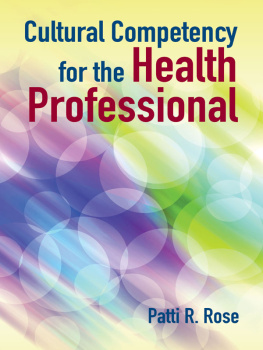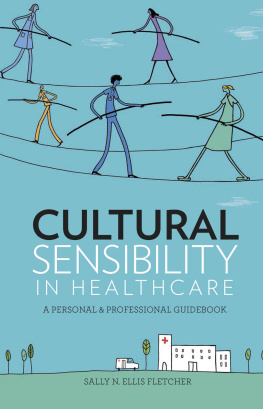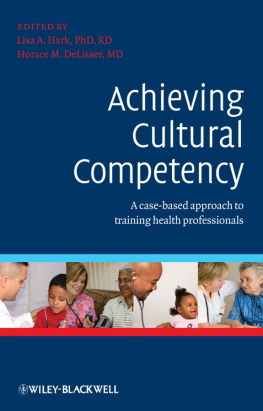Patti R. Rose - Cultural Competency for the Health Professional
Here you can read online Patti R. Rose - Cultural Competency for the Health Professional full text of the book (entire story) in english for free. Download pdf and epub, get meaning, cover and reviews about this ebook. City: Burlington, Mass., year: 2013, publisher: Jones et Bartlett Learning, genre: Politics. Description of the work, (preface) as well as reviews are available. Best literature library LitArk.com created for fans of good reading and offers a wide selection of genres:
Romance novel
Science fiction
Adventure
Detective
Science
History
Home and family
Prose
Art
Politics
Computer
Non-fiction
Religion
Business
Children
Humor
Choose a favorite category and find really read worthwhile books. Enjoy immersion in the world of imagination, feel the emotions of the characters or learn something new for yourself, make an fascinating discovery.
- Book:Cultural Competency for the Health Professional
- Author:
- Publisher:Jones et Bartlett Learning
- Genre:
- Year:2013
- City:Burlington, Mass.
- Rating:5 / 5
- Favourites:Add to favourites
- Your mark:
- 100
- 1
- 2
- 3
- 4
- 5
Cultural Competency for the Health Professional: summary, description and annotation
We offer to read an annotation, description, summary or preface (depends on what the author of the book "Cultural Competency for the Health Professional" wrote himself). If you haven't found the necessary information about the book — write in the comments, we will try to find it.
Cultural Competency for the Health Professional — read online for free the complete book (whole text) full work
Below is the text of the book, divided by pages. System saving the place of the last page read, allows you to conveniently read the book "Cultural Competency for the Health Professional" online for free, without having to search again every time where you left off. Put a bookmark, and you can go to the page where you finished reading at any time.
Font size:
Interval:
Bookmark:

Cultural Competency for the Health Professional
Patti R. Rose, MPH, EdD
University of Miami
Miami, Florida

World Headquarters
Jones & Bartlett Learning
5 Wall Street
Burlington, MA 01803
978-443-5000
www.jblearning.com
Jones & Bartlett Learning books and products are available through most bookstores and online booksellers. To contact Jones & Bartlett Learning directly, call 800-832-0034, fax 978-443-8000, or visit our website, www.jblearning.com.
Substantial discounts on bulk quantities of Jones & Bartlett Learning publications are available to corporations, professional associations, and other qualified organizations. For details and specific discount information, contact the special sales department at Jones & Bartlett Learning via the above contact information or send an email to .
Copyright 2013 by Jones & Bartlett Learning, LLC, an Ascend Learning Company
All rights reserved. No part of the material protected by this copyright may be reproduced or utilized in any form, electronic or mechanical, including photocopying, recording, or by any information storage and retrieval system, without written permission from the copyright owner.
Cultural Competency for the Health Professional is an independent publication and has not been authorized, sponsored, or otherwise approved by the owners of the trademarks or service marks referenced in this product.
Production Credits
Publisher: William Brottmiller
Acquisitions Editor: Katey Birtcher
Managing Editor: Maro Gartside
Associate Editor: Teresa Reilly
Production Manager: Julie Champagne Bolduc
Production Editor: Joanna Lundeen
Marketing Manager: Grace Richards
Manufacturing and Inventory Control Supervisor: Amy Bacus
Cover Design: Scott Moden
Cover Image: Marilyn Volan/ShutterStock, Inc.
Printing and Binding: Edwards Brothers Malloy
Cover Printing: Edwards Brothers Malloy
To order this product, use ISBN: 978-1-4496-7212-6
Library of Congress Cataloging-in-Publication Data
Rose, Patti Renee.
Cultural competency for the health professional / Patti R. Rose.
p. ; cm.
Includes bibliographical references and index.
ISBN 978-1-4496-1451-5
I. Title.
[DNLM: 1. Cultural CompetencyUnited States. 2. Allied Health PersonnelUnited States. 3. Professional-Patient RelationsUnited States. W 21]
610.696--dc23
2012001358
6048
Printed in the United States of America
16 15 14 13 12 10 9 8 7 6 5 4 3 2 1
With deep and abiding gratitude, I dedicate this work to my wonderful husband, Jeffrey, and our two beautiful and intelligent children, now young adults, Courtney and Brandon. I am extremely proud of these three fantastic people and love them intensely. I have been blessed with the joyful experience of being married to my husband for over 25 years and we have been honored with the gift of raising two wonderful children together. This dedication is offered to Jeff, Courtney, and Brandon, humbly and with appreciation that life has given us cherished moments and memories together that will last a lifetime.
Also, although they have departed this earth, I dedicate this book to the memory of my beloved brother Rande, who, beyond being my sibling, was a wonderful friend, and my mother, Effie, who was the strongest and most intuitive woman I have ever encountered. They both inspired me and helped me to define myself in this complex world. They solidified my understanding that people are in your life for a season/reason/lifetime. I enjoyed both the season and reason for sharing a portion of my life experience with them and I am grateful that I had the experience of knowing them.
The 2010 Census data has emerged, and it is clear the United States is more diverse than ever before. Consequently, the term minority, which is used to describe various racial groups and the Hispanic ethnic group, in terms of their previous national percentages relative to the mainstream population, is becoming obsolete. The current replacement term for minority is emerging majority. This new information is relevant to health professionals and will help them serve these emerging majority groups in a more culturally competent manner. According to Kosoko-Lasaki, Cook, and OBrien (2009, p. xiii), Cultural competency has been addressed by legislative, accreditation and regulatory mandates since 1946 (Hill-Burton) Act (p. xiii). To some this is a known fact, but I often encounter individuals who disagree with the necessity for cultural competency. For example, I recently gave a presentation for approximately 300 health professionals at a university. The lecture was entitled Cultural Competency in the Clinical Setting. The main points in my lecture, also covered in this text, were to explain the difference between cultural competency and diversity, provide insight into nuances of various cultural groups, and review the cultural competence continuum.
After the lecture I was met with a long line of students, eager to ask questions and speak with me one-on-one. One student approached me and indicated he had a great deal of concern about the focus of my talk; he stressed that it promoted tribalism. He believed all people immigrating to the United States or from a minority group living in the United States should assimilate to the mainstream culture. He also believed that there should not be accommodations made to meet their needs but they should conform to our way of life. Interestingly, I was not surprised by his comments. There are always individuals in attendance who have strongly held beliefs in this regard. From a linguistic competency perspective, some of these same individuals believe that in order to be treated by health professionals, patients must speak English. This view does not take into consideration the need to value and appreciate the diversity of all people, and the importance of health professionals to continually learn about other cultures to ensure the provision of optimal health services.
According to Snipp (2010), The process of identifying some people as like us and others as not like us is one that predates written history and quite possibly was present in the earliest forms of human societies (p. 106). Snipp (2010) further states counting people by race is a tradition deeply embedded within the governing framework of the United States (p. 111). Understanding that there are culturally diverse groups in the United States who may or may not want to assimilate into mainstream culture but nevertheless need health care providers who value and appreciate their diversity, would seem to be an area of agreement in the healthcare field, but is not necessarily the case. Sometimes the lack of cultural understanding leads to areas of concern, including malpractice suits and other forms of disagreement, which are discussed thoroughly in this text.
The health professions are very diverse, with more than 200 recognized professional fields comprising a substantial portion of the US healthcare workforce (all fields except for physicians and nurses are considered within the term health professionals in this text). Because of the enormity of this field, the services are far reaching, resulting in various encounters with culturally diverse individuals. Furthermore, as demographics continue to change rapidly in the United States, occupations in the health professions continue to grow. To meet the needs of health care in the United States, based on the new healthcare reform bill signed into law in 2010, there will inevitably be a need to increase the number of those individuals who can help foster the system through the offering of their expertise. These individuals include but are not limited to physician assistants, medical assistants, physical and occupational therapists, laboratory technicians, radiology technologists, dental hygienists, dieticians, surgical assistants, phlebotomists, audiologists/speech-language pathologists and respiratory therapists. Given that all these health professionals are formally educated, clinically trained and credentialed within the context of the certification process, and registered and/or licensed, it is clear that cultural competency should be included in the process. This inclusion in their education will only enhance the health professionals ability to interact with culturally diverse patients and hopefully provide more positive outcomes. The following is according to Koenig (2008, p. 161):
Next pageFont size:
Interval:
Bookmark:
Similar books «Cultural Competency for the Health Professional»
Look at similar books to Cultural Competency for the Health Professional. We have selected literature similar in name and meaning in the hope of providing readers with more options to find new, interesting, not yet read works.
Discussion, reviews of the book Cultural Competency for the Health Professional and just readers' own opinions. Leave your comments, write what you think about the work, its meaning or the main characters. Specify what exactly you liked and what you didn't like, and why you think so.









